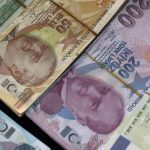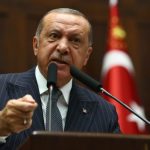Turkey’s nationwide local elections on Sunday look set to become the harbinger of more economic pain for the country.
President Recep Tayyip Erdoğan is on a whirlwind tour of Turkish cities to campaign for his Justice and Development Party (AKP), which is now struggling to contain the fallout of a painful economic recession that is dealing a blow to its popular support.
But while Erdoğan may recoil at the prospect of losing control of major cities such as Ankara, Antalya or even Istanbul, this year’s election, unlike the presidential poll of June 2018, is very unlikely to herald a change in the political guard.
Herein the problem lies. Past economic crises in Turkey – the turbulent 1990s provide the starkest example – led to changes in government. Snap elections provided the chance for Turks to vote in new politicians they hoped could repair financial damage and usher in better, more prosperous times.
Not so in today’s Turkey.
The Turkish lira slumped by more than 4 percent against the dollar on Friday in echoes of a currency crisis last year that ravaged living standards and employment. The economy has shrunk on a quarterly basis for the past two quarters, meaning economic recession is official. Consumer confidence remains near the lowest levels since the 2009 financial crisis.
Turks are fully aware that this week’s elections will bring no change to the country’s political hierarchy after Erdoğan cemented his powers last June, rendering parliament almost powerless and effectively side-lining an already weak opposition. Erdoğan’s most effective political opponent, the pro-Kurdish Selahattin Demirtaş is in jail on terrorism charges.

A build up in foreign currency deposits – central bank figures show that local individuals’ foreign currency savings grew by $1.64 billion to a record $105.7 billion in the week to March 15 – a 23rd-straight week of increases – provides perhaps the starkest example of growing pessimism and perhaps panic among the electorate about the government’s ability to turn the economy around.
Turkey is stuck with Erdoğan’s governing party and his powerful executive presidency, like it or not.
“The past few months we have seen bad non-market policies,” said Tim Ash, senior emerging markets strategist at BlueBay Asset Management in London. “Locals have been voting with their feet into FX because of these. Post-election needs reversal and “normalisation” or it will get ugly again.”
Fears over economic and financial stability meant the Turkish lira ended last year with losses of almost one third against the dollar. If you are to believe the rhetoric of Erdoğan and his government, the currency started plummeting last summer, when a political crisis with the United States peaked over the detention of U.S. pastor Andrew Brunson. Foreign powers and their disloyal allies in Turkey were to blame, or so the story goes.
But the reasons for Turkey’s malaise run far deeper and it appears that an increasing number of Turks are starting to believe this fact.
The Gezi Park protests of 2013, during which many ordinary people expressed their discontent at the AKP by taking to the streets of Istanbul and other major cities, also coincided with a paradigm shift in the outlook for emerging markets as the Federal Reserve moved to end a period of monetary easing.
Since the 2008 global financial crisis, the policies of the Fed and European Central Bank had allowed emerging markets such as Turkey to feed their economies on cheap foreign credit.
But while other countries prepared for more difficult times when the Fed signalled it was about to tighten, Erdoğan’s government allowed Turkish companies to continue gorging on cheap foreign loans. Government spending continued apace, benefitting from a construction boom and high economic growth rates that began looking more precarious by the year.
Since 2013, the lira has lost 68 percent of its value against the dollar, the worst performance among major emerging markets after the Argentinian peso.
In 2017, following a coup attempt against his government the previous July, Erdoğan and his party, preparing for presidential elections, introduced tax cuts and restructured some $50 billion of loans to almost 300,000 companies, backed by Treasury guarantees, to help repair cracks in the economy. The measures helped Turkey expand 7.4 percent that year.
But by the first half of 2018, analysts were warning the government that the economy was severely overheating. While investors began to flee the country, Turks began battening down the hatches for a possible crisis. On May 14, Erdoğan said told Bloomberg Television in London that higher interest rates stoked inflation, contravening commonly held economic theory and unnerving investors further.
In an effort to stave off economic stability ahead of the elections on June 24, Erdoğan announced measures to help the real estate sector and allowed the central bank to raise interest rates. Still, the lira had lost 18 percent of its value between January and June, adding to a decline of 7 percent in 2017.
The rest is recent history. Erdoğan replaced experienced and respected economist Mehmet Şimşek with his son-in-law Berat Albayrak, putting the latter in charge of a merged Finance Ministry and Treasury. Erdoğan also began issuing almost daily presidential decrees on economic policy.
When U.S. President Donald Trump announced economic sanctions against Turkey on Aug. 1, the economy was already teetering on the brink of meltdown. Economic confidence was back at its lowest level since the coup attempt and the Istanbul Chamber of Industry said manufacturing conditions in the country were at their worst since 2009.
Erdoğan’s failure to release Brunson from house arrest – the pastor was accused of conspiring with Kurdish militants and members of the Fethullah Gülen movement – and the U.S. response – more sanctions on Turkish steel were announced a week later – tipped the economy into a currency crisis.
The government’s policies and rhetoric since August have only served to set the stage for further economic uncertainty.
In September, Erdoğan took personal control of the country’s sovereign wealth fund. In policies reminiscent of the turbulent 1990s, he began using state banks under his control to offer below-market rates on loans and to restructure the debts of consumers and businesses. The financial cost of those policies is as yet unknown, but ratings agencies have already started issuing warnings about the credit worthiness of the lenders.
The government has also revived its loan restructuring programme of 2017 to help embattled businesses, many of which are either close to bankruptcy or struggling to repay their debts.
A much-flagged economic programme announced by Albayrak in September contained little of substance.
In perhaps the most graphic example of unorthodox economic policy, the government began selling cheap food at state-run stalls in market squares earlier this year in an effort to rein in inflation, which stands at almost 20 percent.
Tax cuts on a swathe of consumer goods including cars and washing machines have been extended from March 31 to June and beyond. That decision prompted the International Monetary Fund to warn last week that the government needed to come up with a coherent set of policies to right the economy.
Lack of tax revenues meant that the budget deficit widened more than eight-fold in February from a year ago to 16.8 billion liras ($3 billion). Expenditure jumped an annual 33 percent.
Meanwhile, the central bank’s foreign currency reserves, depleted due to last year’s currency crisis, fell again this month. Net reserves shrank by $6.3 billion to $28.5 billion in the two weeks to March 15. The bank’s executives, who Erdoğan can now dismiss or appoint, thanks to another presidential decree, have yet to provide a full explanation for the decline, while rumours suggest the money was used to support the lira.
Last week, Erdoğan once again ruled out any possibility of financial aid from the IMF, which provided backstops whenever Turkey fell on hard times in the 1990s.
Analysts estimate that Turkey may need upwards of $50 billion to sort out its financial problems, which largely relate to the foreign debts of its cash-strapped businesses. With bad loans climbing, some of the nation’s banks may need to be recapitalised, despite the country’s financial regulators giving them a clean bill of health just a few months ago.
With the nation’s press largely stifled, Erdoğan firmly in charge of the state apparatus and opposition politicians either ineffectual or in jail, it is no wonder that this week’s elections are seen as little more than a popularity test for Erdoğan. Should the AKP lose one or two major cities to the opposition, it will constitute a blow to Erdoğan’s standing and doubtless to his pride.
But with the next presidential and parliamentary elections scheduled for June 2023, the country’s centenary year, Turks appear to have no other choice than to buckle down for a rollercoaster ride on the economy. With little chance or appetite within the AKP to remove Erdoğan or to loosen his grip over decision-making, it seems there will be no one else around to help.
By Mark Bently
Source: Ahval News
The opinions expressed in this column are those of the author and do not necessarily reflect those of Ahval.



